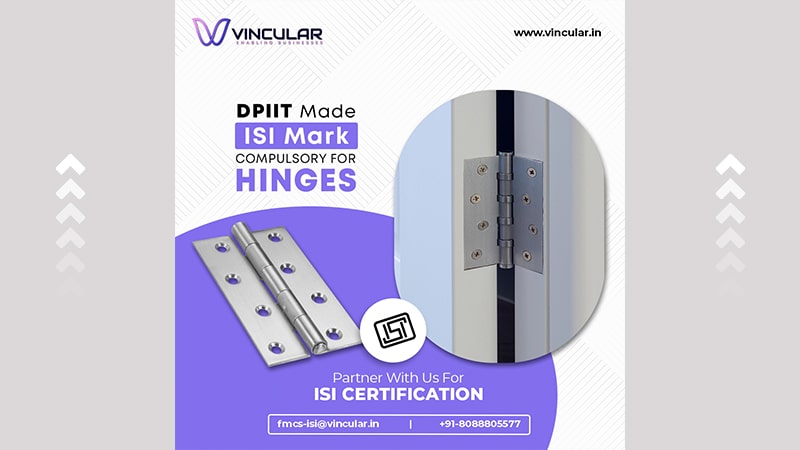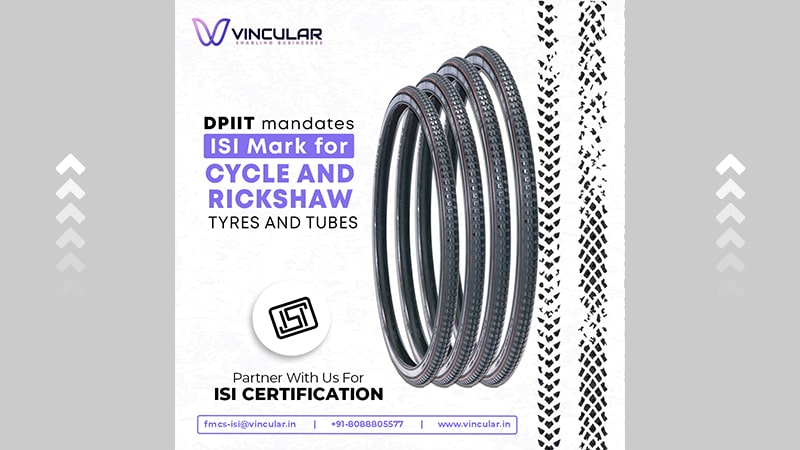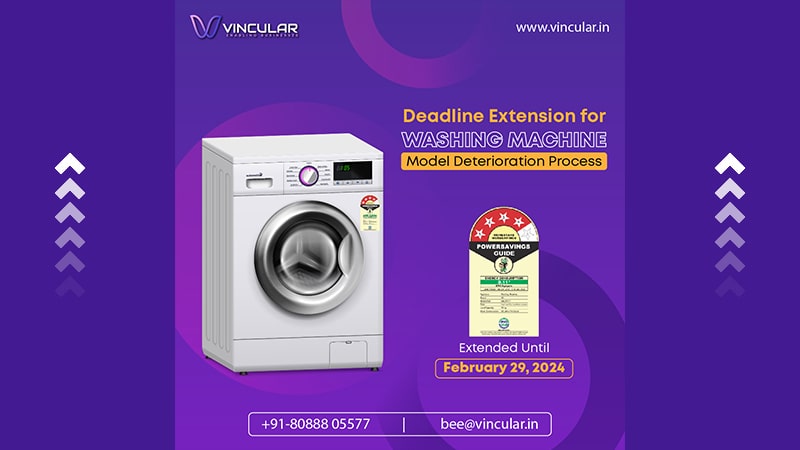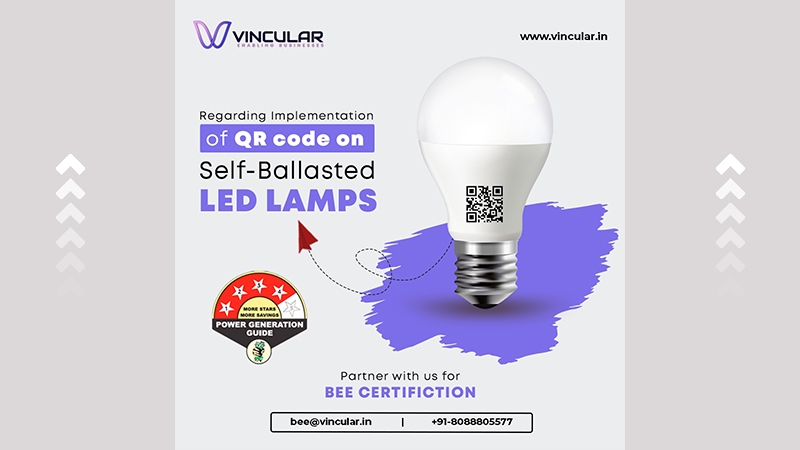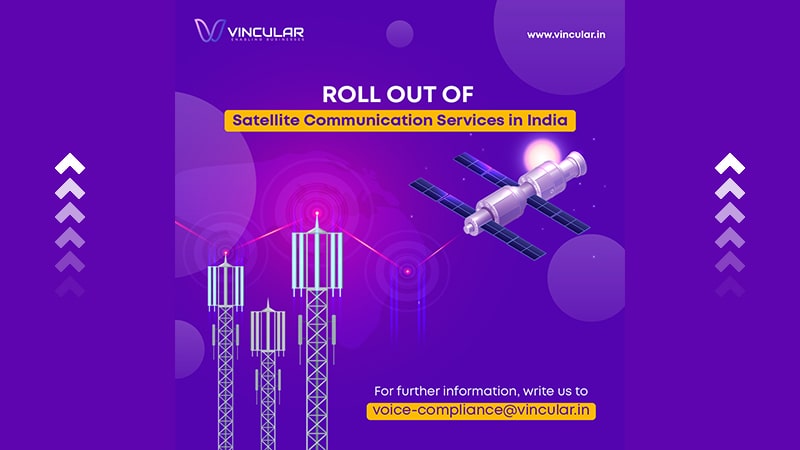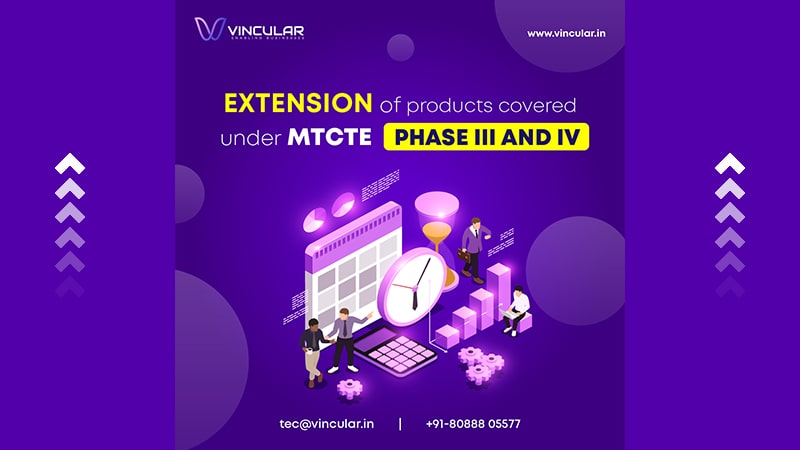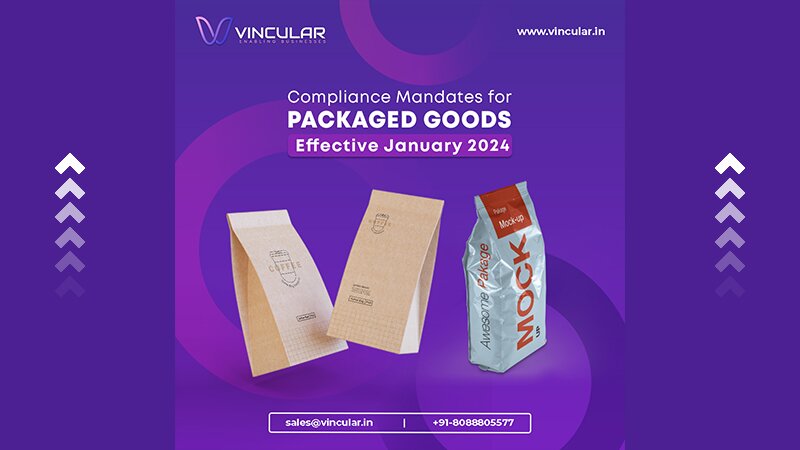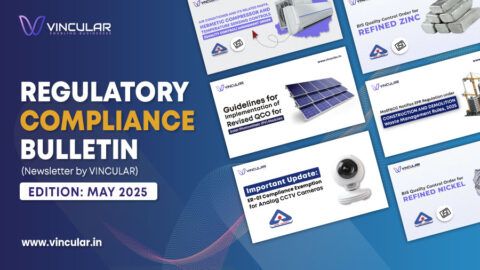ISI
DPIIT Mandates ISI Mark for Safes and Locks
The DPIIT recently issued a Quality Control Order (QCO) that makes the ISI Mark mandatory for Safes, Safe Deposit Locker Cabinets, and Key Locks. This regulation will take effect six months after its publication in the Official Gazette.
Here are the specific implementation dates for Micro and Small Enterprises (MSEs):
🔰 For Small Enterprises compliance is mandatory from September 8, 2024.
🔰 Micro Enterprises compliance is mandatory from December 8, 2024.
This step aims to enhance the safety standards and quality assurance for these products, ensuring consumer reliability and security.
DPIIT made ISI Mark compulsory for Hinges
To enhance safety measures, the Department for Promotion of Industry and Internal Trade (DPIIT) issued a pivotal order on December 8, 2023, specifying the mandatory requirement of ISI Mark for the following hinge types:
1. Stainless steel butt hinges
2. Steel Butt Hinges
3. Non-ferrous metal butt hinges
4. Tee and strap hinges
5. Parliament hinges
6. Continuous (Piano) hinges
7. Steel back flap hinges
8. Double-acting spring hinges
9. Cabinet hinges
The timeline for compliance is as follows:
- Small Enterprises must ensure compliance by September 8, 2024.
- Micro Enterprises are mandated to comply by December 8, 2024.
This regulation seeks to strengthen the industry by enforcing stringent safety standards, emphasizing the need for specific standards for these different hinge variants, thus promoting safety for both consumers and manufacturers.
DPIIT mandates ISI Mark for Cycle and Rickshaw Tyres and Tubes
On December 11, 2023, the Department for Promotion of Industry and Internal Trade (DPIIT) announced a Quality Control Order (QCO). They’ve made it mandatory for Cycle and Rickshaw Tyres and Tubes to have an ISI Mark.
As per the directive, the order will be officially placed after six months of publication in the Official Gazette.
Implementation dates for Micro and Small Enterprises (MSEs) are:
🔰 Small Enterprises have until December 11, 2024.
🔰 Micro Enterprises have until September 11, 2024.
This rule is a big step by the government to make sure these industries meet high standards, keeping consumers safe and making the industry more competitive.
For further information refer to the official notification from here.
DPIIT made ISI Mark Compulsory for Pressure Cooker Gaskets
On December 14th, 2023, the DPIIT made it mandatory for Rubber Gaskets used in Pressure Cookers to carry the ISI Mark.
This rule becomes official six months after being published in the Official Gazette.
Implementation dates for Micro and Small Enterprises (MSEs) are:
🔰 Small Enterprises have until September 14, 2024.
🔰 Micro Enterprises have until December 14, 2024.
The significance of this mandate lies in ensuring the safety and quality of rubber gaskets used in pressure cookers, safeguarding consumers from potential hazards associated with substandard materials.
For further information refer to the official notification here.
ISI Mark is Now Mandatory for Woven Sacks
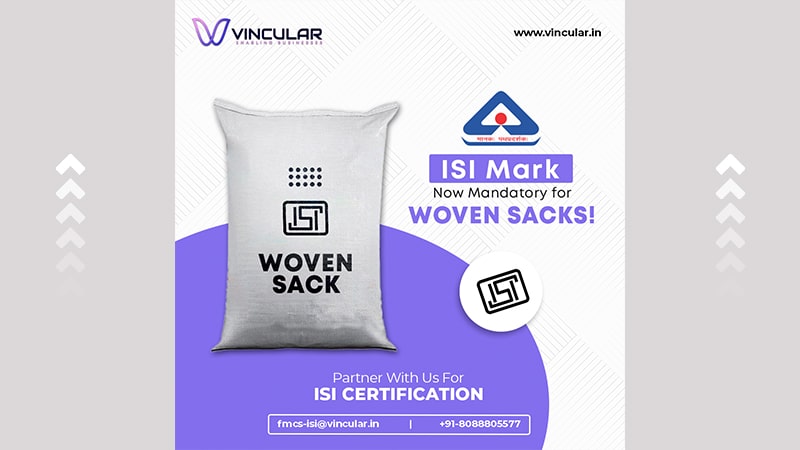
The Department of Chemicals and Petrochemicals has taken a major step towards enhanced fertilizer quality by issuing a Quality Control Order (QCO) on December 6, 2023.
This order mandates the ISI Mark for all High-Density Polyethylene (HDPE) and Polypropylene (PP) woven sacks used for fertilizer packaging.
The implementation date of this QCO is June 6, 2024.
Note: It shall not apply to Woven sacks meant for export.
BEE
Deadline Extension for Washing Machine Model Degradation Process
Following the notification issued on 17th November 2023, the Bureau of Energy Efficiency (BEE) has announced an extension in the deadline for applying for the Model Degradation process for registered models of Washing Machine.
The revised deadline is now extended until February 29, 2024.
For further details in this regard, please visit the link here.
Ensure your washing machine models are complying by updating them with the latest changes from the Bureau of Energy Efficiency within the given deadline.
Regarding the Implementation of QR codes on Self-Ballasted LED Lamps
Concerning the implementation of the QR code, the Bureau of Energy Efficiency (BEE) has released a notification dated December 5, 2023.
According to this notification, all permittees and manufacturers of Self-Ballasted Light Emitting Diode (LED) Lamps registered under the Standards & Labeling (S&L) program of BEE are instructed to refrain from including QR codes on LED Lamps until further information from the respective department.
Extending the Duration of the Star Rating Plan for Distribution Transformers
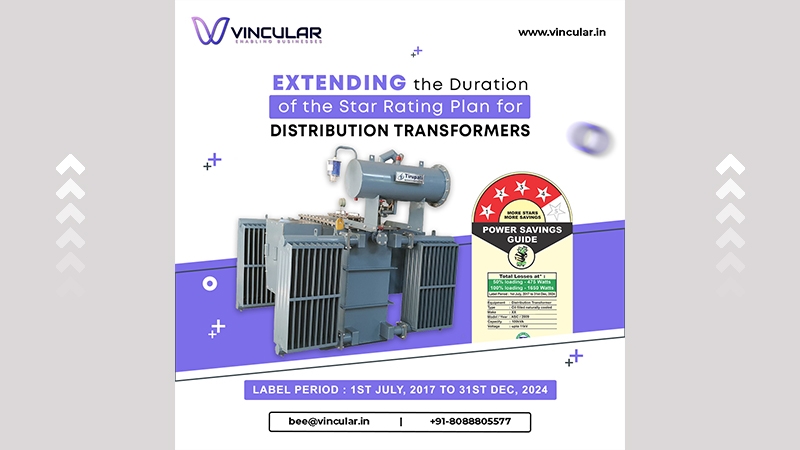
The Bureau of Energy Efficiency (BEE) has extended the validity of the Star Rating table of Distribution Transformers.
The star rating validity, originally set to expire on 31st December 2023, has now been extended for an additional year until 31st December 2024.
Consequently, the validity period for approved models will now encompass the period from 1st July 2017 to 31st December 2024.
The platform for submission of model continuation applications has been activated starting from 15th December 2023. Manufacturers are encouraged to adhere to the specified timelines (which is 31st January 2024) to ensure compliance for their registered Distribution Transformer models.
For further details in this regard, please visit the link here.
Deadline Extension for Water-cooled and Air-cooled Chillers Model Degradation Process
Following the notification issued on 4th October 2023, the Bureau of Energy Efficiency (BEE) has announced an extension in the deadline for applying for the Model Degradation process for registered models of Chillers.
The revised deadline is now extended until February 29, 2024. For further details in this regard, please visit the link here.
Also, starting from 1st January 2024, Water-cooled and Air-cooled chillers are included in the mandatory certification regime.
Advisory for permittee/manufacturers of Washing Machines
In light of the notifications released on November 17, 2023, and December 18, 2023, the Bureau of Energy Efficiency (BEE) has issued an advisory regarding energy efficiency compliance for Washing Machines, as follows:
-
Given the extension of the deadline for applying the model degradation/continuation process until February 29, 2024, the validity date of the star rating period for registered Washing Machine models has likewise been automatically extended until the same date.
-
There will be no extensions granted beyond February 29, 2024. Permittees who have not yet applied for degradation/continuation are advised to do so promptly.
The link for official notification can be accessed here
Addendum in Operational Manual of Standard and Labelling Program
BEE has introduced an update in one of the clauses of the Operational Manual alternatively known as the Disseminating Star Labeling in Household Appliance (DISHA) Manual.
This modification specifically pertains to the Second Check Testing; a component of the Market Surveillance processes. To provide clarity, both the original clause and the subsequent addendum are presented below for your reference.

It is important to note that all other terms and conditions of the (DISHA) Manual remain unchanged.
BIS-CRS
BIS Stakeholders Consultation Meeting on implementation of parallel testing
Industry Parallel testing was initially introduced from 01st Jan 2023 to 30th June 2023 for Mobile Phone only. This concept of applying BIS certification was introduced to reduce the lead time of certification of a product.
Parallel testing allows the testing of critical components along with host products at the lab, while registration of all critical components and host products remains sequential.
Since the response from the industry for this initiative was limited during the pilot phase of 6 months, BIS decided to extend it for another 6 months with two more product categories Wireless headphones/earphones and laptop/notebook/tablet categories.
On 15th December 2023 stakeholder meeting was held between BIS (MS. Chitra Gupta-DDG), Industry Association (MAIT), MEITY, Brands and Testing labs the major takeaway and updates of the meeting were as follows-
-
During 2nd phase of the pilot project (July 2023- Dec 2023) the response of applicants remains very low

-
Industry is aligned with the BIS initiative, but the parallel testing must be a permanent provision for all products because the Industry needs to plan the product launch if the parallel testing will be permanent, it will help the brand to opt for parallel testing while applying for certification.
-
Laboratories showed positive responses towards parallel testing, and they will not face any challenges if parallel testing is implemented for all products.
Note: Parallel Testing is allowed by BIS only when the critical components (i.e. Cell, Battery) and host product (i.e. Mobile Phone) are both to be tested. In case the host product is not tested at the lab then the critical component will not be considered for parallel testing. \
Updated Notification for Random Sampling of LED Products and Drivers from CBIC
BIS certification is mandatory for Various LED products including control gears under the CRS scheme, later MEITY also authorized customs authorities/officers to deform the non-compliant/unregistered products at all ports of entry.
Furthermore, DGFT released a notification 32/2015-2020 dated 17th Sep 2020 and mandates for random sampling of LED products and LED Drivers during import which was aligned to achieve a similar goal differently.
Recently CBIC (Central Board of Indirect Taxes & Customs) also released a notification F. No. 401/67/2023-Cus-III dated 12th Dec 2023 for streamlining the process of random sampling during the import of products-
-
Customs will check BIS certification in the system.
-
The Risk Management system randomly selects consignments for sampling and intimate customs officer
-
The sample drawn will be sent to BIS-recognised labs for non-destructive safety parameter testing (lab will be identified via www.lims.bis.gov.in)
-
The sample will clear only if it complies with the requirements of Indian standards as tested by a lab. In case the sample fails it will be sent back or destroyed at the cost of the importer.
BIS Portal Updates
During 3rd week of December 2023, the BIS portal was further revamped with two new options-
-
Notifications for Manufacturer: BIS will send notifications important for manufacturers here.
-
Delete Application/Request: Applicant may apply for rejecting any application through this option, though it is not operational as of date.
BIS Facilitation Centre
BIS introduced a new Facilitation Centre to address the concerns of stakeholders.
Toll-Free Number: 1800-11-1206
Timing: 9 AM to 6 PM all days except National holidays
Existing numbers (+91 7669089324 and +91 7669089325) will not remain valid. All enquiries will be addressed via this facilitation centre. Highly technical enquiries will be addressed by BIS officers only.
Extension of Self-Certification Deadline for SPV Inverters
The timeline for the self-certification of Solar PV Inverters for CRS certification has been extended till 31st Dec 2024.
This extension is granted due to the limited availability of test facilities for certain capacities, allowing more time for compliance. Specifically, the extension applies only to SPV Inverters with a capacity exceeding 100 kW (>100 kW) (items 4-5).
On the other hand, the implementation of QCO 2017 for SPV inverters with a capacity of up to 100 kW is effective from January 1, 2024.
Applicants seeking BIS Certification for Solar Inverters after December 31, 2023, are required to adhere to the guidelines and notifications issued by MNRE.
Official notification of MNRE can be accessed here.
WPC
Implementation of NavIC in mobile handsets
MAIT supports the government in the implementation of NavIC and this progressive approach. On the same note, the following points are highlighted.
-
At present, implementation of NavIC on the L5 band is difficult due to design, cost and complexity issues. On the contrary, the L1 Band is globally recommended from a design and cost viability perspective in all mobile phones.
Industry proposes that once ISRO launches the minimum required L1 Band Satellites, then the implementation of NavIC would be more effective.
-
MAIT is of the view that the mandatory implementation of NavIC in mobile phones should be deferred. Till such time, the industry can go in for voluntary implementation on any of the bands and get time for fine-tuning.
-
The government wants smartphone makers to include technology that supports NavIC, India’s navigation system. For 5G phones, this must be done by January 1, 2025, and for other devices using GPS, they need to have NavIC support by December 2025.
This means manufacturers must either use NavIC-powered chips or include special NavIC chipsets in their devices to meet these deadlines.
Voice Compliance
Roll out of Satellite Communication Services in India
Satellite communication services in India in the upcoming years will play a vital role by enabling crucial services such as telemedicine, and distance education and supporting business growth through high-speed connectivity.
With improved connectivity, businesses can expand their operations geographically. This expansion shall create new opportunities, and attract new customers leading to the overall economic growth of the country.
The Telecom Bill was introduced in the lower house of Parliament to regulate the telecom sector and to replace the prevailing outdated laws.
One of the key features of the bill includes provisions regarding the assignment of spectrum. Along with a few other services, the spectrum for satellite communication services should be allocated administratively over the traditional competitive auction method.
Opting for an administrative spectrum allocation approach for satellite communication could position India in alignment with global standards. This move has the potential to encourage international collaboration, promote innovation, open doors for startup ventures, and enhance the nation’s standing in the worldwide satellite market.
Exciting developments in India’s satellite communication sector are set to enable essential services and promote comprehensive growth of the country.
TEC
Extension of Mandatory Security Testing of Wi-Fi CPE and IP Router under MTCTE
The mandatory date for security testing of Wi-Fi CPEs and IP Routers has been extended by 3 months, i.e., from 1st January 2023 to 1st April 2024. TEC will now accept online applications for security certification on integrated MTCTE and NCCS portals, from April 2024.
This is the second extension for security testing requirements under MTCTE; the effective date was relaxed by six months in the previous extension, i.e., from 1st July 2023 to 1st January 2024.
Official notification from the regulator can be accessed here.
Re-classification of Notified Products as GCS & SCS Category under MTCTE
To promote the ease of doing business, TEC has announced the re-categorization of notified products as GCS (Generalized Certificate Scheme) & and SCS (Simplified Certification Scheme) category under the Mandatory Testing & Certification of Telecom Equipment (MTCTE) regime. The above measures will be effective from 1st January 2024.
Below are the current GCS categories:
-
Base Station for Cellular Networks
-
BSC RNC
-
Compact Cellular Network
-
Repeater for Cellular Network
-
HF Radio
-
Mobile Radio Trunking System
-
PTP PMP Microwave Fixed Radio Systems
-
Satellite Communication Equipment
-
VHF UHF Radio System Equipment
-
Base Station for Cellular Network for 5G
-
E-band Fixed Radio Relay Systems
The remaining 49 categories have been moved to the SCS scheme. Further, only administrative fees will be charged for ER-based applications submitted under MTCTE irrespective of GCS & SCS category. Other terms and procedures for applications shall remain unchanged.
Official Notification can be downloaded from here.
Extension of Products Covered under Phase-3 and Phase-4
TEC has given further relief to stakeholders by extending the mandatory certification deadline for 12 products (ERs) covered under MTCTE phases 3 and 4. The deadline has been pushed from January 1, 2024, to April 1, 2024. The extended categories are as follows:
Phase-3
-
Base Station for Cellular Network
-
Repeater for Cellular Network
-
Smart Electricity Meter
Phase-4
-
SIM
-
HF Radio
-
Mobile Radio Trunking System
-
VHF UHF Radio System Equipment
-
PTP PMP Microwave Fixed Radio System
-
LAN Switch
-
Router
-
IP Security Equipment
-
Satellite Communication Equipment
The mandatory date for the remaining 32 product categories (Phase-3 and Phase-4) will remain unchanged i.e., 1st January 2024.
Furthermore, the acceptance of ILAC test reports (non-border sharing countries) for technical parameters has been extended by 3 months i.e., 31st Dec 2023 to 31st March 2024 for the below 8 products (ERs) only:
Phase-3:
-
Base Station for cellular network
-
Repeater for Cellular Network
-
Compact Cellular Network
Phase-4:
-
SIM
-
HF Radio
-
VHF UHF Radio System Equipment
-
Radio Broadcast Receiver RBR
-
Satellite Communication Equipment
Note: As of the date of submission of test reports, the validity of ILAC test reports/results shall be up to two years concerning the above products (ERs).
To download the official notification, please click here.
Waste Management
CPCB Upgrades E-Waste EPR Portal for Streamlined Producer Obligations
CPCB has come up with an update to the E-waste Extended Producer Responsibility (EPR) online portal. The portal has been updated with new features. The latest improvements represent a major advancement in terms of simplifying and maximizing Producers’ EPR obligations.
Key Updates Include:
-
Portal has been updated to file the Annual Returns.
-
Producers can update the Sales data on the portal a regular intervals of time.
-
Portal has the visibility of the EPR target as per the new framework for the generation of EPR certificates for each metal i.e., Gold (Au), Aluminium (Al), Copper (Cu) and Iron (Fe).
-
Producers can view the available EPR credit for each metal.
These improvements streamline compliance and empower producers to manage their EPR responsibilities efficiently.
Urgent Compliance Directive Regarding Plastic Packaging for Cigarettes
In contrast to previous directives, the Central Pollution Control Board (CPCB) has recently released a notification to Tobacco Companies addressing the crucial shift toward eco-friendly packaging and claiming the use of biodegradable plastics in their packaging.
However, an investigation has revealed that the testing laboratory, Intertek India Pvt Ltd, lacks official recognition by BIS. Consequently, the purported use of biodegradable plastics for cigarette packaging violates the Plastic Waste Management (PWM) Rules.
This notice serves as an opportunity for the Indian Tobacco Company to comply within 15 days of its issuance. Failure to adhere to this directive may necessitate action by the CPCB as specified under Section 5 of the Environment Protection Act.
For more details, access the official notification from here.
Immediate Action Required by Airlines to Comply with Plastic Ban and EPR Registration
CPCB has requested airlines to comply with the ban on single-use plastic and register on the Centralized Extended Producer Responsibility (EPR) Portal for Plastic Packaging, as per the Plastic Waste Management Rules 2016. An action report was expected within 15 days of the initial directive, but there has yet to be an update.
To avoid penalties under the Environmental (Protection) Act 1986, CPCB is urging Airlines to submit an Action Taken Report within 15 days of receiving this letter.
This report should detail the steps taken to adhere to the plastic ban and the registration on the EPR Portal.
LM
New Compliance Mandates for Packaged Goods Effective FROM 01 January 2024
Department of Consumer Affairs has amended the rules for the declaration of manufacturing date, MRP and quantity in the Legal Metrology (Packaged Commodities) Rules, 2011.
These laws were introduced on November 2, 2021, and were supposed to come into effect on April 1, 2022. However, they have been extended to give the industry time to adjust.
However, as of 1st January 2024, the aforementioned regulations are now mandatory. All packers, importers, or manufacturers dealing with packaged goods must adhere to these rules to avoid legal consequences.
Under the new rules the following amendments have been made:
-
The month and year in which the commodity is manufactured shall be mentioned, and earlier the month and year in which the commodity is manufactured or pre-packed or imported was required.
-
Mandating the declaration of Maximum Retail Price (MRP) in Indian Currency as ₹ xx. xx (inclusive of all taxes).
-
The quantity can be expressed in any word which represents the quantity in the package.
-
The amended rule substitutes the word ‘Value Added Tax (VAT)’ or ‘Over Tax (TOT)’ with “Goods and Service Tax” i.e. GST only. Previously, the rules applied to retailers under VAT or TOT.
-
Requiring every package within a group of packages offered for retail sale through promotional offers to adhere to labelling declarations defined in the Legal Metrology (Packaged Commodities) Rules.
Additionally, a new label declaration has been introduced which demands the mention of the unit sale price for retail sale products, facilitating easier price comparison during purchases.
The unit sale price can be specified as follows: Rs.__ per g, Rs.__ per kg, Rs.__ per cm, Rs.__ per meter, Rs.__ per ml, Rs.__ per litre. These changes aim to empower consumers and safeguard their interests.
Access the official notification from here.
CDSCO
India Aims for MedTech Independence with “MedTech Mitra” Initiative
India is gearing up to revolutionize its healthcare landscape and reduce dependence on medical device imports with the launch of “MedTech Mitra.”
This ambitious program aims to empower innovators, boost domestic production, and propel the MedTech sector to a $50 billion market by 2030.
Empowering Innovation:
“MedTech Mitra” provides a platform for nurturing young talents through guidance, resources, and regulatory support. This streamlined system helps innovators turn their ideas into reality.
Reducing Dependency:
Currently, India imports a staggering 80% of its medical devices. This initiative aims to change that by fostering local development of affordable, high-quality technologies, ultimately reducing reliance on imports.
Exponential Growth:
Rapid advancements in technologies like robotics, AI, and VR are expected to drive the sector’s growth, leading to a projected $50 billion market by 2030.
Fostering Collaboration:
The program emphasizes facilitating collaborations among stakeholders and breaking silos to ease innovation and pave the way for an “Atmanirbhar Bharat” in the MedTech sector.
“MedTech Mitra” marks a significant step towards empowering Indian innovators and creating a self-reliant healthcare ecosystem.
This ambitious initiative has the potential to not only transform India’s medical landscape but also position the country as a global leader in the MedTech industry. You can access the website from here.
Miscellaneous
Mandatory Air-Conditioned Cabins for Commercial Trucks: Government Directive from October 2025
Ministry of Road Transport and Highways (MoRTH) has issued a notification in which they mandated the installation of air-conditioning systems in the cabins of motor vehicles belonging to categories N2 and N3, manufactured on or from 1st October 2025.
This directive specifically targets commercial trucks/ motor vehicles used for the carriage of goods within the N2 and N3 categories, determined by their Gross Vehicle Weight (GVW). The breakdown is as follows:
N2 Category:
GVW: Exceeding 3.5 tonnes but not exceeding 12 tonnes.
N3 Category:
GVW: Exceeding 12 tonnes.
To ensure effective implementation of the new regulation, the ministry outlined that the testing of the cabin fitted with an air-conditioning system must adhere to the standards specified in IS 14618:2022, to make sure the air conditioners work well and do their job reliably.
This is a great initiative towards work conditions and the state of mind of the truck drivers, recognizing their pivotal role in the transport sector—one of the most important areas for India.
Source: pib.gov.in/PressReleaseIframePage.aspx?PRID=1985016
About Meftal Spas
Meftal Spas a self-prescribed drug widely found in households, is a go-to solution for pain relief, especially favoured by individuals dealing with arthritis and among women coping with menstrual pain. This drug has recently been scrutinized, making its way into news headlines.
Meftal Spas brand-name medication that contains mefenamic acid and dicyclomine in which,
Mefenamic Acid:
-
What it is: Mefenamic acid is a type of medicine that falls into the non-steroidal anti-inflammatory drug (NSAID) category.
-
What it does: It helps in reducing pain, fever, and inflammation.
Dicyclomine:
-
What it is: Dicyclomine is an antispasmodic.
-
What it does: It relaxes smooth muscles, especially in the digestive tract.
-
Menstrual periods
-
Muscle aches
-
Headaches
-
Arthritis
-
Irritable bowel syndrome (IBS)
Why is it News?
The Government of India (GOI) has raised safety alarms as this drug triggers potential side effects/ADR (Adverse Drug Reaction), like the development of DRESS syndrome, a severe allergic reaction, and gastrointestinal issues like stomach ulcers and bleeding.
Therefore, the respective Authority have issued a cautionary advisory for all to be aware of its usage, emphasizing proper selling practices, and highlighting the need for close monitoring of ADR, particularly related to Mefenamic Acid.
Recommendation for the Future
Avoid the habit of referring to Google/ self-prescription for any painkiller consumption.
Remember, it’s always best to consult a healthcare professional for personalized advice on managing pain and cramps.
Stay Updated, Stay Compliant – Subscribe Now!
From changes in policies and regulations to crucial compliance notifications, we’ve got you covered.
Subscribe to our LinkedIn Newsletter to receive your monthly dose of vital updates and expert advice.
For daily updates, you can also subscribe to our WhatsApp Channel or watch our Publication Space.



